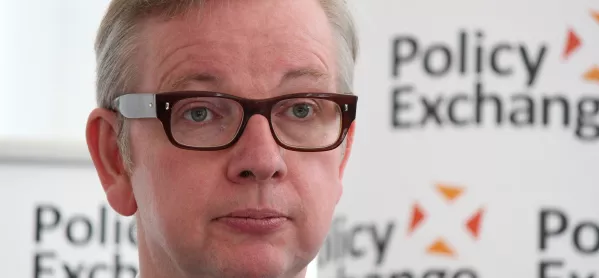It’s time to make new (school) year’s resolutions.
Few school years can have started with education in a greater state of turmoil. During the 2016-17 academic year, teachers and school leaders will face more changes than they have ever done in a single year. Curriculum change piled on top of new tests and examinations, alongside continuing structural revolution.
And the author of most of these changes? He has moved on. Like so many secretaries of state before him, Michael Gove (pictured) is not around to oversee the implementation of the changes he introduced, nor to get the credit or the blame for what goes right or wrong.
Before the ink was dry on much of the legislation and the implementation phase had hardly got under way, Gove had been moved on to the Ministry of Justice and would soon become more interested in pulling the UK out of the EU than in his programme of prison reform. Then, with a new prime minister, with whom he had previously crossed swords - as he had done with so many in his own party - he was out of government altogether. Alas, ringside seats for the conversation between Theresa May and Gove were not for sale, for they would surely have fetched a high price. I have an inkling that, before long, Michael Gove will tire of being a backbench MP and will return to the intellectual cut and thrust of his previous profession, journalism, perhaps as editor of The Times or Telegraph.
A big part of the problem for the maintained education service in England is the frequency with which ministers change. With an average of just over two years in office, secretaries of state know that they have to act quickly if they are to leave their mark.
‘Never has so much change hit teachers so hard’
Meanwhile, those who work in schools are left to implement the changes, while reading in the newspapers of the next changes on the horizon. Never has so much change hit teachers so hard as this year. For secondary teachers, this includes changes to A level, AS and GCSE, changes in the GCSE grading system, new syllabuses and exams, new accountability measures and the English Baccalaureate. For primary teachers, who are coming to terms with a new curriculum and painstakingly introducing a new assessment system, the end product is undermined by the key stage 2 Sats shambles this summer.
It will be so easy to be overwhelmed by all this change, so it will be doubly important this year to concentrate on what really matters - the children and young people in school and the quality of teaching, learning and assessment day by day. This is where teachers can make a difference, unlike the mad extent of change in 2016-17. So, at the start of the first term of the school year, new year’s resolutions should focus on the important - increasing the life opportunities of the pupils, undertaking top quality professional development, getting to grips with the best research, working with teachers in other schools to improve practice, improving the quality of teaching, better learning-focused assessment, and so on.
Whatever anyone thinks of the individual changes, it is the number of simultaneous changes that represents the major problem for schools. And, when the balance sheet of change is finally drawn up in a future education audit, the effect of each change will be impossible to separate out and nobody will know which of the changes has been successful.
In the words of the 19th-century prime minister Lord Salisbury, “Change, change, change, who wants change? Things are bad enough as they are.”
Happy New Year!
John Dunford is chair of Whole Education, a former secondary head, general secretary of the Association of School and College Leaders and national pupil premium champion. He tweets as @johndunford
Want to keep up with the latest education news and opinion? Follow TES on Twitter and like TES on Facebook




